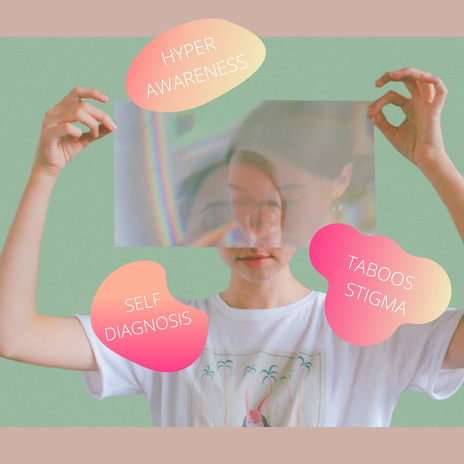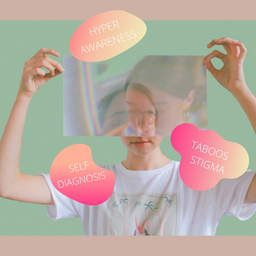Edited by- Anav Sawhney
Globally, the discourse surrounding mental health has made leaps and strides, and having broken the confines of medical and psychological contexts, has taken on a popular life. One needs to look no farther than the plethora of memes, gifs, and tweets that speak of mental health in either informative or ironic and humorous ways. Whilst the spread of awareness is of paramount importance, the ideas surrounding mental health are demonstrating a phenomenon common to all ideas that undergo a rise in popularity. In addition to the medico-psychological meanings and implications, there is also an added socio-cultural connotation to specific illnesses and ideas. In other words, a popular meaning. The popular understanding of ideas is always the make or break.
One can expect little from those who lack the awareness and the wherewithal to grasp such issues as well as those who are sceptics to begin with. But I think there is another unexpected party that is contributing to a growing distortion in the understanding of mental health. I speak from my own context as a privileged urban-educated citizen attending an elite university. I notice in many of my peers and classmates a pervasive tendency to pathologize their emotional and mental conditions and conceive of themselves as potentially mentally ill. There is a twofold issue that has allowed for the catalysis of such a trend in our country’s privileged youth. To begin with, there is a severe lack of quality mental health professionals in our country. Moreover, even the students that have access to them are not yet financially independent and need the approval of their parents in order to visit a therapist. The taboos and misconceptions surrounding mental health run rampant in the older generations of even the urban elite, thereby barring access for those who are well aware of how therapy functions.
For the demographic that I am referring to, this dichotomy between a hyper-awareness regarding mental illness and the lack of proper access is pernicious.
The problem of self- diagnosis comes from another source that I find more sinister in nature. If we think of a concept as a hermeneutical tool that allows an individual to give words to a certain kind of experience, then psychology, psychiatry, and medicine, delve deep into conditions that cause the body to experience ‘dis-ease’. Here are a few examples to make matters clearer. Peoples of primitive civilisations believed the ill to be possessed by evil spirits. Hippocrates believed a ‘wandering womb’ to be the cause of many pathologies within women. Even Freud who was an iconic figure in twentieth century psychology has been proven wrong by newer generations of researchers’ time and again. Legitimacy aside, the ideas of each of the aforementioned parties acted as a means of giving word to a certain condition and described its origins and solution. And the people who underwent any kind of ailment and those who took care of them used these ideas as a means of understanding their experiences. They were the hermeneutical categories of their historical moment. However, this does not mean that they always brought one closer to the truth. The point at hand being simple: Medicine and psychology are not objective though they are upheld as such.
The problem that I witness in the people around me is not the fact that they use mental health as a hermeneutical tool to articulate their experiences. The problem is the unquestioned precedence it takes over the possibility of it being an emotional upheaval and the way in which one can no longer speak of emotional upheavals and reactions without medicalising them. Mental health has become an authority that deems the legitimacy of someone’s experience, which is to say, if they aren’t mentally ill, then it is concluded that their psycho-emotional issues are not severe. Being mentally ill or not has become a means to assign a degree to an individual’s experience. These are judgements that are passed at a social level but viewed from an institutional level the implications are even more problematic. Many students often find themselves in a peculiar situation where they really need their troublesome psycho-emotional issues to be symptomatic of an underlying mental illness. Else, they will not receive the pardons that they need with their coursework and assignments. Mind you, I speak of individuals who are genuinely troubled by whatever their issue is and are sincere about their claims. All institutions from corporations to universities have a standard perspective on what is and is not a legitimate reason to meet their requirements. It is undoubtedly a brilliant move forward that mental health comes under a legitimate cause. But the unfortunate fallout is the aforementioned conflict.
My goal in bringing forth all these arguments is to question the authority and reverence with which we treat discussions surrounding mental health, at the cost of it becoming a blanket justification for incredibly toxic behaviour not only towards others but towards one’s own self. If mental illness becomes the go to hermeneutical category to articulate any kind of internal strife, then are we really different from those primitive peoples who thought they were possessed by evil spirits? Arguably, our methodology of arriving at our beliefs is far superior but are we any closer to the truth than they were? With all my empathy and due consideration, I often wonder if a number of my peers are really mentally ill, or are they the victims of a different contagion, that repeatedly distorts their quest for truth and self-understanding. They have only two options– either mentally ill or not.



